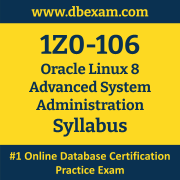 You can use this Oracle 1Z0-106 exam study guide to collect all the information about the Oracle Linux 8 Advanced System Administration exam. The Oracle 1Z0-106 certification exam is mainly targeted to those candidates who have some experience or exposure to Oracle Linux technology and want to flourish their career with Oracle Certified Professional Oracle Linux 8 System Administrator credential.
You can use this Oracle 1Z0-106 exam study guide to collect all the information about the Oracle Linux 8 Advanced System Administration exam. The Oracle 1Z0-106 certification exam is mainly targeted to those candidates who have some experience or exposure to Oracle Linux technology and want to flourish their career with Oracle Certified Professional Oracle Linux 8 System Administrator credential.
The Oracle 1Z0-106 certification exam validates your understanding of the Oracle Linux technology and sets the stage for your future progression. Your preparation plan for Oracle Linux 8 Advanced System Administration Certification exam should include hands-on practice or on-the-job experience performing the tasks described in following certification exam syllabus topics.
Oracle 1Z0-106 Exam Details:
| Exam Name | Oracle Linux 8 Advanced System Administration |
| Exam Code | 1Z0-106 |
| Exam Price | USD $245 (Pricing may vary by country or by localized currency) |
| Duration | 90 minutes |
| Number of Questions | 60 |
| Passing Score | 60% |
| Format | Multiple Choice Questions (MCQ) |
| Recommended Training |
IT Infrastructure Learning Subscription Oracle Linux 8: System Administration |
| Schedule Exam | Buy Oracle Training and Certification |
| Sample Questions | Oracle Certified Professional Oracle Linux 8 System Administrator |
| Recommended Practice | 1Z0-106 Online Practice Exam |
Oracle 1Z0-106 Syllabus Topics:
| Understanding and Configuring the Linux Boot Process and Service Administration |
- Describe the Linux boot process - Describe and configure the GRUB 2 bootloader - Describe and configure kernel boot parameters - Describe the configure systemd system and service manager |
| Understanding System Configuration options |
- Describe the /etc/sysconfig directory - Describe the /proc and /sys filesystems - Configure and maintain kernel parameters using the /proc filesystem and the sysctl utility - Configuring system time with chrony, NTP and PTP |
| Installing and Maintaining Packages |
- Explain and configure dnf repositories - Use the dnf utility |
| Automating Tasks |
- Configure cron and anacron jobs - Use the at and batch utilities |
| Oracle Ksplice |
- Describe Ksplice concepts and configuration - Use Ksplice uptrack commands |
| Managing Users and Groups |
- Create, modify and delete user accounts and groups - Implement the user private group schema - Describe and configure password aging and hashing algorithms |
| Managing Filesystems and Swap |
- Create, modify and remove disk partitions - Create and manage Linux Filesystems - ext, xfs, btrfs - Describe and configure swap space |
| Managing Storage Devices |
- Configure and maintain LVM components - Configure MD driver and software RAID devices |
| Managing the Network Configuration |
- Describe network configuration files - Describe and Use NetworkManager - Use networking command line utilities - ip, nmcli |
| Using OpenSSH |
- Describe OpenSSH concepts and configuration - Use Open-ssh commands (ssh, scp sftp and ssh-keygen) and ssh tunneling, x11 forwarded |
| Managing Linux Security |
- Create and maintain a chroot jail - Configure firewalld packet filters - Configure nftables packet filters |
| Managing System Logging |
- Describe and configure rsyslog - Describe and configure log rotation - Describe systemd-journald and use the journalctl utility |
| Monitoring and Troubleshooting Linux |
- Use the iostat, mpstat, vmstat, sar, top, iotop, and strace utilities - Describe and use ss and wireshark - Describe the available operating system logs to assist in troubleshooting - Use the dmesg utility |
| Managing Pluggable Authentication Modules (PAM) | - Describe and configure PAM |
| Advanced Networking |
- Describe and Configure Network Bonding - Describe and Configure Virtual Local Area Networks (VLANs) |
| Advanced Storage Administration |
- Describe access control lists (ACLs) - Describe and configure encrypted block devices - Create Udev rules |
| Managing File Sharing |
- Configure and maintain a NFS server and NFS client - Describe, configure and maintain the automounter - Describe and configure vsftpd |
| Security Enhanced Linux (SELinux) |
- Describe and configure SELinux modes, policies, and booleans - Describe and configure SELinux file labeling, context, and users |
| Control Groups (Cgroups) |
- Describe control group implementation in Linux 8 - Describe systemd slice units and scope units - Control access to system resources |
| Container Services |
- Describe container concepts and Podman configuration - Pull an image and run a container with Podman - Describe Kubernetes concepts and configuration - Describe and create Kubernetes pods and other Kubernetes resources |
| Linux Auditing System |
- Describe Linux Auditing concepts and configuration - Use the auditctl command to configure audit rules - Use Linux Auditing commands to query audit log file and view audit reports |
The Oracle Linux Advanced System Administration Certification Program certifies candidates on skills and knowledge related to Oracle Linux products and technologies. The Oracle 1Z0-106 is granted based on a combination of passing exams, training, and performance-based assignments, depending on the level of certification. Oracle Linux 8 Advanced System Administration certification is a real benchmark of experience and expertise that helps you stand out in a crowd among employers. To ensure success, Oracle recommends combining education courses, practice exams, and hands-on experience to prepare for your Oracle Certified Professional Oracle Linux 8 System Administrator certification exam as questions will test your ability to apply the knowledge you have gained in hands-on practice or professional experience.
